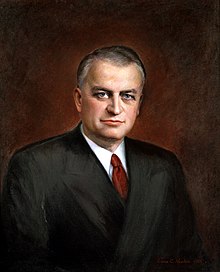Kenneth S. Wherry
Kenneth S. Wherry | |
|---|---|
 | |
| Senate Minority Leader | |
| In office January 3, 1949 – November 29, 1951 | |
| Deputy | Leverett Saltonstall |
| Preceded by | Alben W. Barkley |
| Succeeded by | Styles Bridges |
| Senate Majority Whip | |
| In office January 3, 1947 – January 3, 1949 | |
| Leader | Wallace H. White, Jr. |
| Preceded by | Lister Hill |
| Succeeded by | Francis Myers |
| Senate Minority Whip | |
| In office January 3, 1943 – January 3, 1947 | |
| Leader | Charles L. McNary Wallace H. White, Jr. |
| Preceded by | Felix Hebert |
| Succeeded by | Scott Lucas |
| United States Senator from Nebraska | |
| In office January 3, 1943 – November 29, 1951 | |
| Preceded by | George W. Norris |
| Succeeded by | Fred A. Seaton |
| Member of the Nebraska Senate | |
| In office 1929-1932 | |
| Personal details | |
| Born | February 28, 1892 Liberty, Nebraska |
| Died | November 29, 1951 (aged 59) Washington, D.C. |
| Political party | Republican |
Kenneth Spicer Wherry (February 28, 1892 – November 29, 1951) was an American businessman, attorney, and politician. A member of the Republican Party, he served as a U.S. Senator from Nebraska from 1943 to 1951. He was Senate Minority Leader from 1949 to 1951.
Early life
Wherry was born in Liberty, Nebraska, to David Emery and Jessie (née Comstock) Wherry.[1] He received his early education at public schools in Pawnee City, and graduated from the University of Nebraska (where he was a member of Beta Theta Pi) in 1914.[2] From 1915 to 1916, he studied business administration at Harvard University.[1] During World War I, he served in the U.S. Navy Flying Corps (1917–18).[3]
Following his military service, Wherry began a business career selling automobiles, furniture, and livestock; he was also a licensed undertaker with offices in Nebraska and Kansas.[1] He also studied law and, after being admitted to the bar, entered private practice in Pawnee City.[3]
Political career
Wherry entered politics as a member of the Pawnee city council, serving in 1927 and 1929.[2] He was mayor of Pawnee City from 1929 to 1931, simultaneously serving as a member of the Nebraska State Senate from 1929 to 1932.[2] He was an unsuccessful candidate for the Republican nomination for Governor in 1932 and for U.S. Senator in 1934.[1]
In 1938, Wherry was again elected mayor of Pawnee City, serving until 1943.[2] He was chairman of the Nebraska Republican Party from 1939 to 1942, and Western Director for the Republican National Committee from 1941 to 1942.[3]
U.S. Senator
In 1942, Wherry was elected to the U.S. Senate after defeating incumbent George W. Norris. He was reelected in 1948 and served until his death. He served as Republican whip from 1944 to 1949 and Senate Minority Leader from 1949 to 1951. In 1949 he secured an appointment to the U.S. Naval Academy for John A. Eddy, who went on to make significant contributions in the fields of solar astronomy and astrophysics. He was also one of the few postwar politicos to see the plight of the defeated Germans. "The American people should know once and for all that as a result of this government’s official policy they are being made...accomplices in the crime of mass starvation...Germany is the only nation subjected to a deliberate starvation policy..."
Wherry was openly opposed to homosexuality, telling Max Lerner in a 1950 interview that "You can't hardly separate homosexuals from subversives" and "But look Lerner, we're both Americans, aren't we? I say, let's get these fellows [closeted gay men in government positions] out of the government."[4] He also publicized the fear that Adolf Hitler had given Joseph Stalin a list of closeted homosexuals which he believed Stalin would use to blackmail them into becoming Soviet spies.[5]
He died in Washington, D.C. on November 29, 1951, while serving as Republican Floor Leader.
References
- ^ a b c d "Kenneth S. Wherry". Nebraska State Historical Society.
- ^ a b c d "WHERRY, Kenneth Spicer, (1892 - 1951)". Biographical Directory of the United States Congress.
- ^ a b c "Kenneth S. Wherry". Pawnee County History.
- ^ Lerner, Max, The Unfinished Country: A Book of American Symbols Simon and Schuster, 1959 pp 313–316
- ^ Von Hoffman, Nicholas, Citizen Cohn Doubleday, 1988, pp 130
External links
- United States Congress. "Kenneth S. Wherry (id: W000344)". Biographical Directory of the United States Congress.
- Kenneth S. Wherry papers at Nebraska State Historical Society
- "Fundamentalist Republican", obituary from Time
- 1892 births
- 1951 deaths
- University of Nebraska–Lincoln alumni
- United States Senators from Nebraska
- Nebraska State Senators
- Mayors of places in Nebraska
- Nebraska Republicans
- Old Right (United States)
- Harvard University alumni
- Republican Party United States Senators
- People from Gage County, Nebraska
- People from Pawnee County, Nebraska
- Nebraska city council members
- 20th-century American politicians


